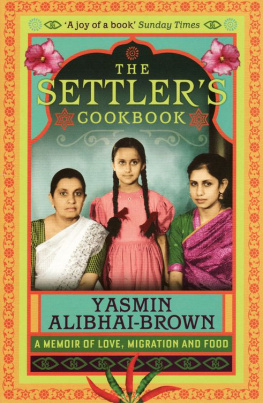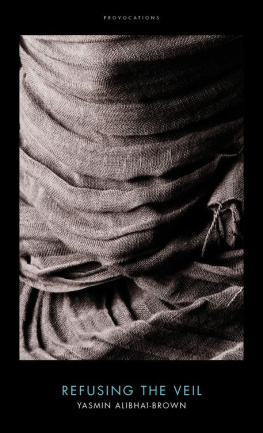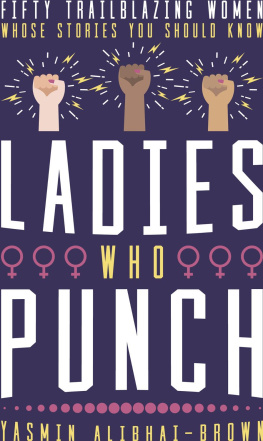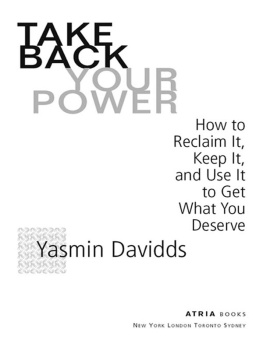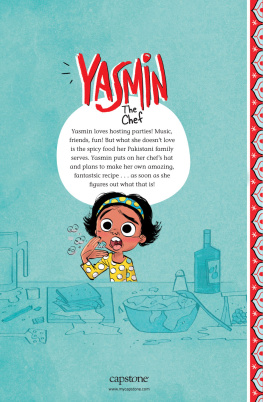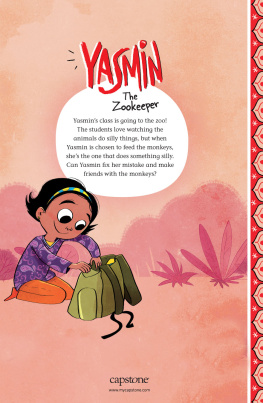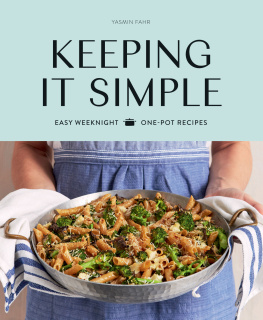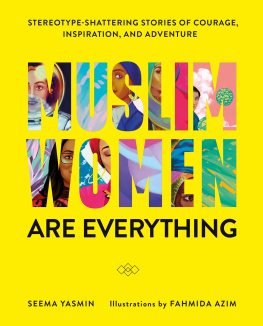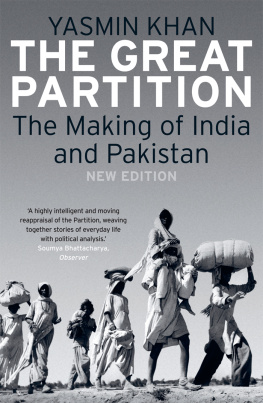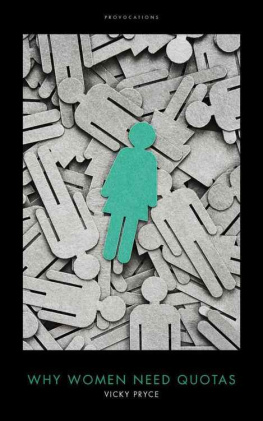Yasmin Alibhai-Brown - The Settlers Cookbook
Here you can read online Yasmin Alibhai-Brown - The Settlers Cookbook full text of the book (entire story) in english for free. Download pdf and epub, get meaning, cover and reviews about this ebook. year: 2012, publisher: Granta Books, genre: Home and family. Description of the work, (preface) as well as reviews are available. Best literature library LitArk.com created for fans of good reading and offers a wide selection of genres:
Romance novel
Science fiction
Adventure
Detective
Science
History
Home and family
Prose
Art
Politics
Computer
Non-fiction
Religion
Business
Children
Humor
Choose a favorite category and find really read worthwhile books. Enjoy immersion in the world of imagination, feel the emotions of the characters or learn something new for yourself, make an fascinating discovery.
- Book:The Settlers Cookbook
- Author:
- Publisher:Granta Books
- Genre:
- Year:2012
- Rating:3 / 5
- Favourites:Add to favourites
- Your mark:
- 60
- 1
- 2
- 3
- 4
- 5
The Settlers Cookbook: summary, description and annotation
We offer to read an annotation, description, summary or preface (depends on what the author of the book "The Settlers Cookbook" wrote himself). If you haven't found the necessary information about the book — write in the comments, we will try to find it.
The Settlers Cookbook — read online for free the complete book (whole text) full work
Below is the text of the book, divided by pages. System saving the place of the last page read, allows you to conveniently read the book "The Settlers Cookbook" online for free, without having to search again every time where you left off. Put a bookmark, and you can go to the page where you finished reading at any time.
Font size:
Interval:
Bookmark:

From the reviews of The Settlers Cookbook:
More than a hundred recipes pepper The Settlers Cookbook, but readers with scant interest in cookery should not be deterred from this wonderful book. If the recipes were stripped away, a memoir of real substance would remain This is a path-breaking record, but also a compelling, moving narrative: of shifting identities, survival and the strength of maternal love Independent
Alibhai-Brown paints a lively picture of a community that stayed trapped in old ways until it was too late to change she is gripping when it comes to their best-known moment of turbulence : the expulsion from Uganda the people of the Ugandan Asian diaspora lead less sharply privileged, more anonymous lives these days They are also, thanks to this brave book, a little better recorded than they were before Guardian
Alibhai-Browns story of acculturation, and her own success as a sharp-minded, at times sharp-tongued, commentator on race, multiculturalism and human rights, is as lively as her journalism The Times
Its beautifully written, as you would expect, and utterly fascinating. There are some wonderful dishes here too Tribune
Alibhai-Browns own migration is intimately bound up with the fate of other East African Asians It is a story seldom told, and Alibhai-Browns account of it is fascinating and touching Sunday Times
Interlaces reminiscences and ruminations on the life of the migrant with mouth-watering recipes London Review of Books
A rare contribution to the cookery book meets family history genre New Humanist
[An] admirable, highly personal endeavour packed with some evocative recipes Time Out
Moving and uplifting Big Issue (in the North)
In a touching and frank account, she captures an image of a private Asian community who owned most of Ugandas wealth by the time Idi Amin came to power Alibhai-Brown moves from African and British politics to the pain of divorce and existential loss, while introducing cookery in an original, seamless and dramatic way, using food not only to inform us about the different culinary cultures she has experienced and interpreted, but also to enhance the stories that she tells Times Literary Supplement
For Jena, my mother (19202006), who was feisty and tender.She gave me mettle, a wakeful conscience, a few gold bangles(rarely worn, for she was a simple woman) and a precioussupply of inventive recipes that tell our stories.
For London, city of feasts and commotion,now my terra firma, my cause.
I am filled with nostalgia for something I never had
Tamar Yellin
I AM INDEBTED TO all those people from East Africa, now global citizens, who shared their experiences and feelings about our old homeland. It is a truism but completely true in this case that without them there would be no such book of memories. Unlike some others in the business who couldnt see why a political columnist should want to write a food memoir, my publisher, Portobello, saw possibilities. Tasja Dorkofkis understood what I wanted to write from the first time we met for a coffee, and Philip Gwyn Jones was wonderfully enthusiastic. I thank them both. And my beloved husband Colin, who started off unusually chary as I embarked on this project but who came round after scoffing the dishes detailed in the book. Ari, Leila and Liz are my nearest and dearest. They should understand this heritage one day and be proud of it. Finally, thank you to those relatives and good friends of all backgrounds who never give up on me, even though my journalism and waywardness must try their patience.
O UR FAMILY TREE IS puny, barren in large part. The roots dont go down deep enough to produce a plenteous crop of ancestral stories or fruity relatives . The few memories hanging on are losing colour and juice, soon will wither and fall away.
The human urge to trace long, biological bloodlines is strong. But our far past was swept away by careless fate impetuously carrying off my folk across the seas, away, away to new beginnings. They took little and left behind even less. Like many other East African Asians whose forebears left India in the nineteenth century, I search endlessly for (and sometimes find) the remains of those days. Few maps mark routes of journeys undertaken by these migrants; hardly any books capture their spirit or tell the story. Then Africa disgorged us too, and here we are, people in motion, now in the West, the next stopover. There is no place on earth we can historically and unequivocally claim to be ours, and so we have become adept wayfarers who settle but cautiously, ready to move on if the winds change.
Ayar Ata, a Kurdish refugee in London, writes an ode to capture the global drifters attachment to bits and pieces portable, potent reminders of loss and gain too:
Under my bed there it was my seemingly little suitcase
inside it my few precious belongings.
A present from my Grand mum, an evenly shaped
light blue stone with white spots spread all over it, a familiar
piece of early morning sky with stars twinkling in the palm of my hand
A photo of my mother smiling at me in despair
waving and wondering
A broken watch with frozen hands.
I carry around with me unfashionable bags holding too many things I dont need but might, just in case: extracts of the Koran in Arabic and English, an old photograph of my university in Uganda, a hanky used to mop up tears when I married Colin, a pill box and rosary that belonged to my mother, hospital notes, job references an exiles survival kit.
In my sunny, high-tech kitchen, one small cupboard keeps cooking paraphernalia I brought over from Kampala in 1972, the year we Asians were cast out of Uganda by the sadistic black nationalist Idi Amin. I had arrived in Britain a few months before his expulsion orders and was never to return to my old homeland. Into a storeroom back home went a box with my precious vinyl collection Cliff and Elvis, Chuck Berry, the Supremes, Ray Charles, Marvin Gaye, Mary Wells, Helen Shapiro (where did she go?), Martha Reeves and the Vandellas, Jimmy Ruffin, the Beatles, Jim Reeves, Millie, Sandie Shaw, Pat Boone, Connie Francis, Ravi Shankar, Bismillah Khan, Hindi song discs by Lata Mangeshkar, Mohammed Rafi, Talat Mehmood and Mukesh, and poorly recorded Congolese jigs which always incited my buttocks to quiver. Also placed in storage (never reclaimed) were my Eng Lit books, a painstakingly assembled canon of the greatest writers. Many were gifts from eager educators who had drawn this avid pupil into poetry, drama and the novel. Almost all my photos, wrapped tenderly, catalogued then arranged in a small, red suitcase, were entrusted to a friend who then had to join the exodus. No time then to think of photos.
Why I transported old pots and pans to England I cannot explain. I try but am unable to throw them away. The motley collection has had several stays of execution. During cleaning fits, I chuck them into a box to be dumped, and they return back to the house, just in time.
There is a wooden contraption for grating hairy, brown-shelled coconuts. The device has not been used on these shores and is mummified with paper and layers of oil to keep it from cracking and rusting. Two slabs of wood are cleverly put together to make a folding stool. A flat, oval, rusting metal blade sticks out in front, like the head of a tortoise.
The coconut was broken, its sweet, cloudy juice drained into a glass which always went to the favourite child in the extended family, always a boy, always overweight and a bloody nuisance. Then the kitchen servants sat astride the grater as if on a saddle, except it was so low their knees come up almost to their shoulders. With both hands they rolled the half-sphere over the blade with a zigzag edge. Sometimes, they slashed their hands and harsh employers abused them for what they thought was native idiocy. Or for contaminating the white flesh with their inferior blood. Boiling water was added to the grated coconut, and the mixture was then poured into a straw basket shaped like a long sausage to be squeezed. Imagine the agony. The burning, pitchy hands added a sweetness you can never reproduce.
Font size:
Interval:
Bookmark:
Similar books «The Settlers Cookbook»
Look at similar books to The Settlers Cookbook. We have selected literature similar in name and meaning in the hope of providing readers with more options to find new, interesting, not yet read works.
Discussion, reviews of the book The Settlers Cookbook and just readers' own opinions. Leave your comments, write what you think about the work, its meaning or the main characters. Specify what exactly you liked and what you didn't like, and why you think so.

